Module 3 Journey to space Unit 3 课件(共37张ppt) 外研版八年级下册
文档属性
| 名称 | Module 3 Journey to space Unit 3 课件(共37张ppt) 外研版八年级下册 |
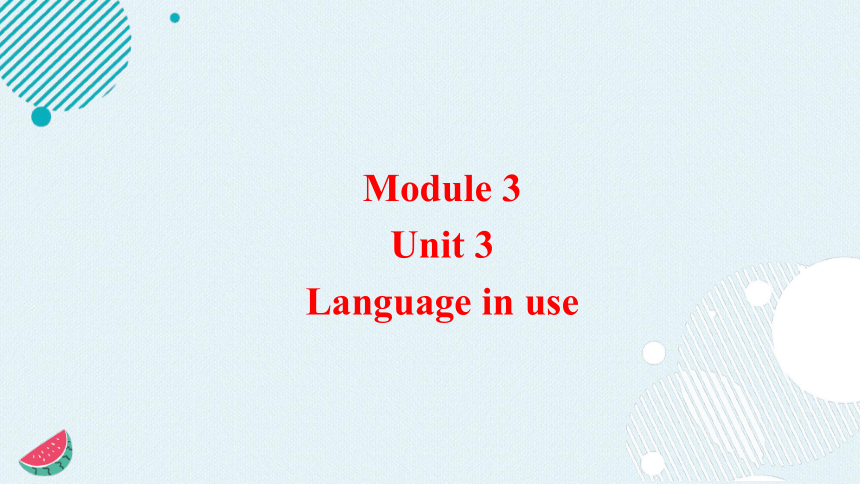
|
|
| 格式 | pptx | ||
| 文件大小 | 26.9MB | ||
| 资源类型 | 教案 | ||
| 版本资源 | 外研版 | ||
| 科目 | 英语 | ||
| 更新时间 | 2024-11-24 00:00:00 | ||
图片预览


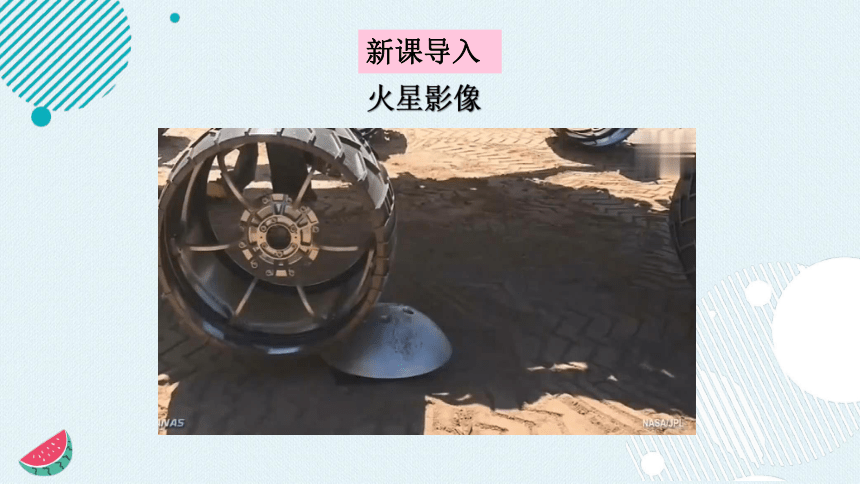
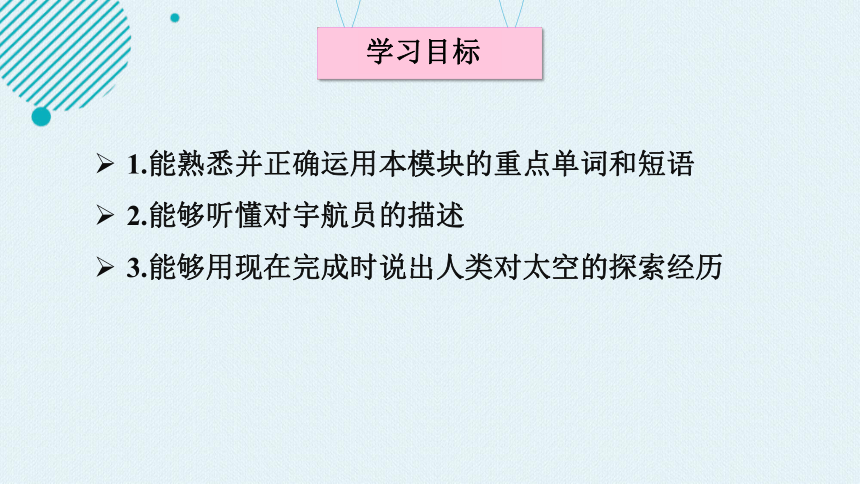
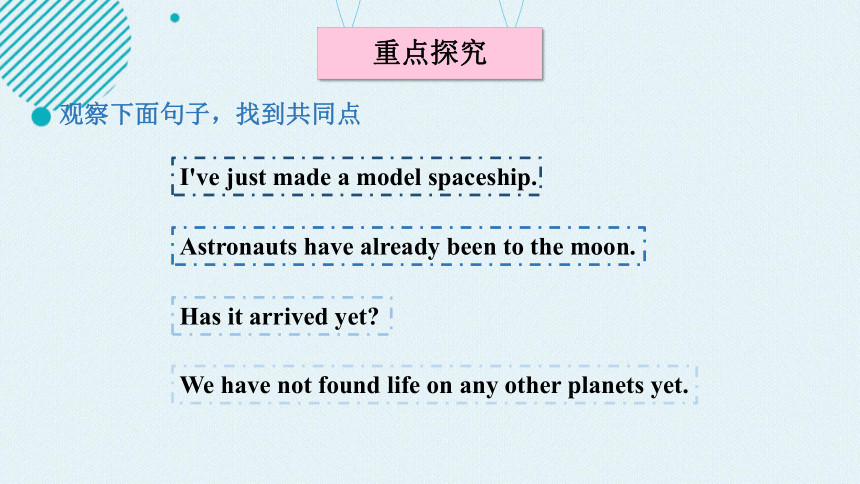
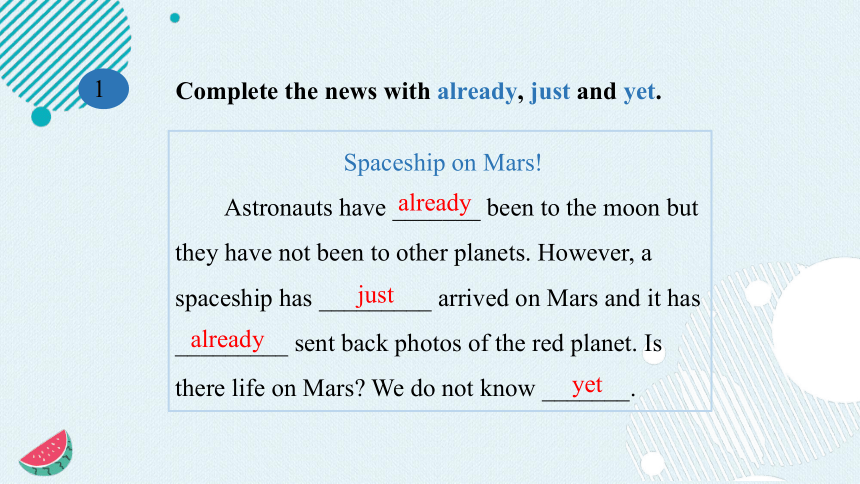
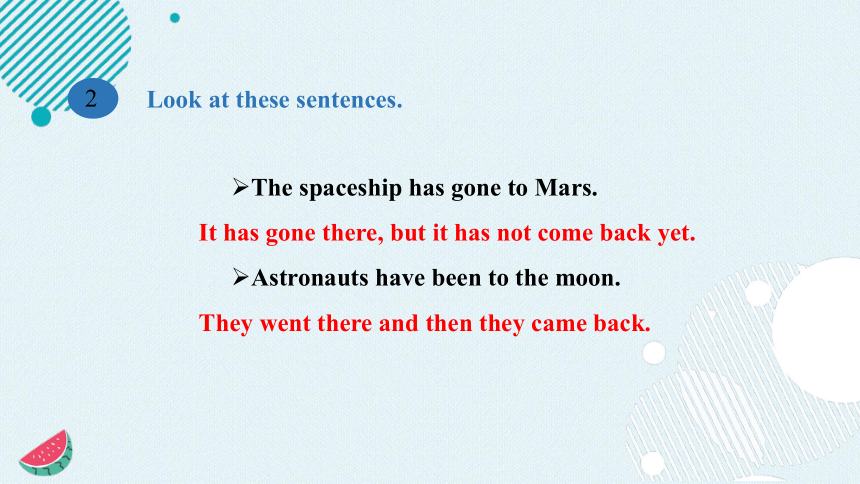
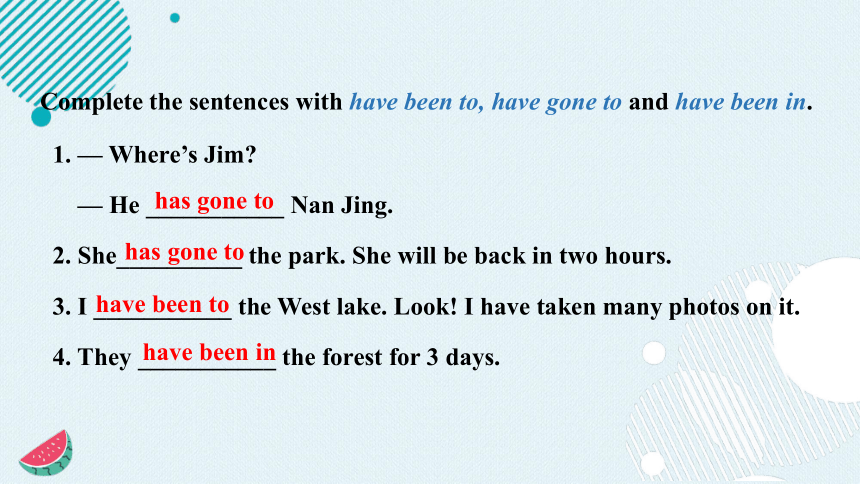
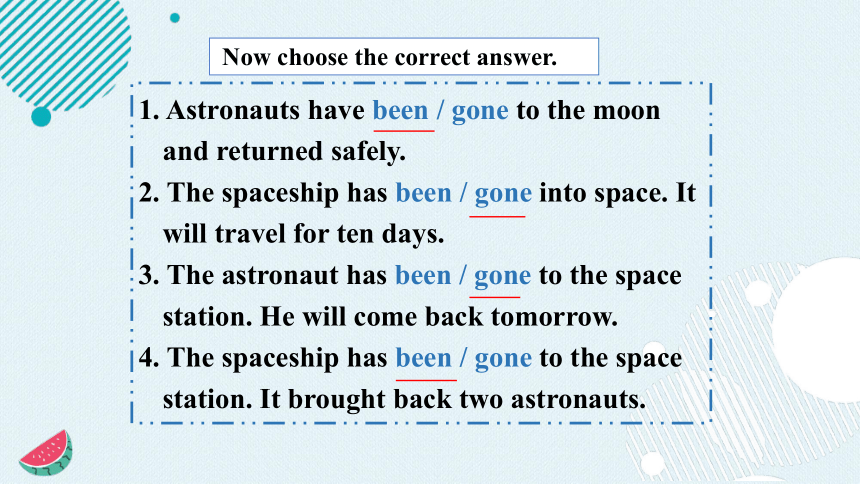
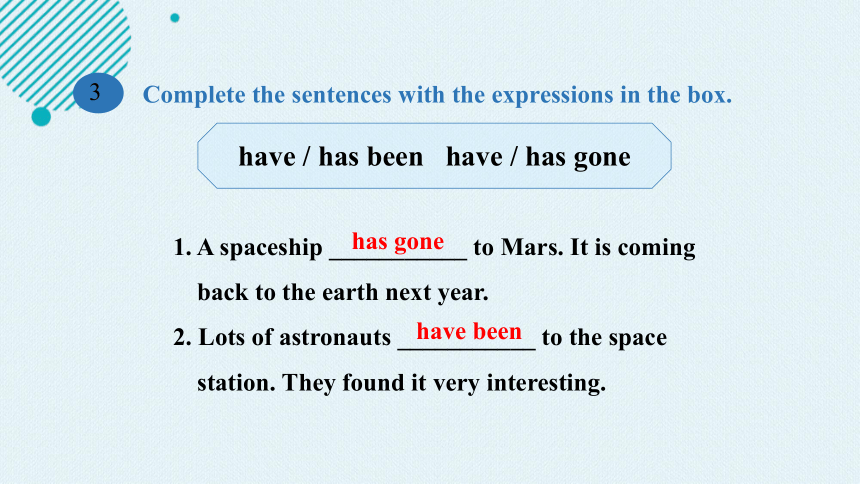

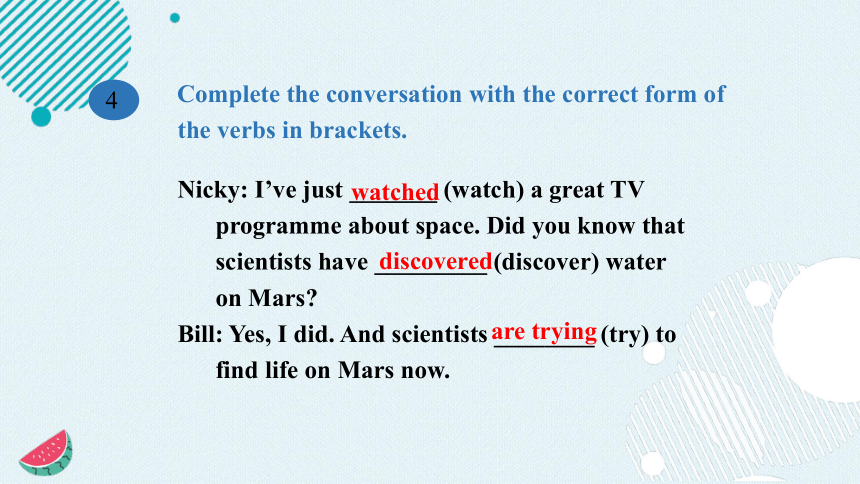
文档简介
Module 3
Unit 3
Language in use
学习目标
重点探究
自主学习
学习导航
当堂检测
课堂总结
拓展提升
新课导入
火星影像
学习目标
1.能熟悉并正确运用本模块的重点单词和短语
2.能够听懂对宇航员的描述
3.能够用现在完成时说出人类对太空的探索经历
重点探究
观察下面句子,找到共同点
I've just made a model spaceship.
Astronauts have already been to the moon.
Has it arrived yet?
We have not found life on any other planets yet.
1
Complete the news with already, just and yet.
Spaceship on Mars!
Astronauts have _______ been to the moon but they have not been to other planets. However, a spaceship has _________ arrived on Mars and it has _________ sent back photos of the red planet. Is there life on Mars? We do not know _______.
already
just
already
yet
Look at these sentences.
The spaceship has gone to Mars.
It has gone there, but it has not come back yet.
Astronauts have been to the moon.
They went there and then they came back.
2
1. — Where’s Jim?
— He ___________ Nan Jing.
2. She__________ the park. She will be back in two hours.
3. I ___________ the West lake. Look! I have taken many photos on it.
4. They ___________ the forest for 3 days.
has gone to
have been to
have been in
has gone to
Complete the sentences with have been to, have gone to and have been in.
Now choose the correct answer.
1. Astronauts have been / gone to the moon and returned safely.
2. The spaceship has been / gone into space. It will travel for ten days.
3. The astronaut has been / gone to the space station. He will come back tomorrow.
4. The spaceship has been / gone to the space station. It brought back two astronauts.
Complete the sentences with the expressions in the box.
3
have / has been have / has gone
1. A spaceship ___________ to Mars. It is coming back to the earth next year.
2. Lots of astronauts ___________ to the space station. They found it very interesting.
has gone
have been
3. Some astronauts __________ to the moon twice.
4. Two British astronauts _________ to the space station. They will come back in January.
have gone
have / has been have / has gone
have been
Complete the conversation with the correct form of the verbs in brackets.
4
Nicky: I’ve just _______ (watch) a great TV programme about space. Did you know that scientists have _________ (discover) water on Mars?
Bill: Yes, I did. And scientists ________ (try) to find life on Mars now.
watched
discovered
are trying
Nicky: Yes, they’re looking for life but they ____________ (not find) anything yet.
Bill: There were some new photos of Mars in the newspaper today. _____ you ______ (see) them yet?
Nicky: Yes. They're amazing!
haven’t found
seen
Have
5
Work in pairs. Role-play the conversation in Activity 4.
Role-play
Complete the email with the words in the box.
been just met never read written yet
FROM:
TO:
SUBJECT:
Liu Dan
Li Fang
I have found a great book.
Dear Li Fang,
I’ve _______ finished reading a great
just
6
book at school. I haven’t ______ anything as good as that for a long time! It’s a story about the solar system. In the book, the writer imagines that astronauts have ________ to Mars. I’ve ______ thought about that before and I think it’s very interesting.
I haven’t ______ any famous in my life but I hope one day I can meet an
read
been
met
never
astronaut. I’ve ______ to a Chinese astronaut for more information about space and his experience of space travel. I hope he will write back. He hasn’t ______. Maybe he is too busy. I’m still waiting.
Best wishes,
Liu Dan
written
yet
Listen and complete the notes.
7
The astronaut joined CNSA _____ years ago.
2. He has flown in a spaceship _____times.
six
two
3. He felt ______ when he was in the spaceship.
4. He has been to the space station ______.
5. The earth was blue and very __________
when he saw it from the space station.
6. He decided to be an astronaut because he
has always been _________ in space.
excited
twice
beautiful
interested
Tapescript
Interviewer: Today's programme is about
space travel. I'm talking to an
astronaut from CNSA. Hello,
we're interested to hear about
your experiences in space. When
did you join CNSA?
Astronaut: Six years ago.
Interviewer: And how many times have you
flown in a spaceship?
Astronaut: Two times.
Interviewer: How did you feel when you were
in the spaceship?
Astronaut: I enjoyed it. It was very exciting.
Interviewer: Have you worked on the space
station?
Astronaut: Yes, I have. I've already been
there twice.
Interviewer: Have you seen the earth from the
space station?
Astronaut: Yes, I have. It's very blue, and
very beautiful.
Interviewer: How wonderful! How did you feel
when you saw it?
Astronaut: I was so happy. I wanted to cry.
interviewer: I'm sure. Tell me, why did you
decide to become an astronaut?
Astronaut: I've always been interested in
space. It's so exciting!
Interviewer: Do you think there's life on other
planets?
Astronaut: Yes, I do. The universe is so big.
There are so many galaxies, and
so many solar systems.
Interviewer: But we haven't found anything yet.
Astronaut: We've only just begun to look.
Give us time!
Interviewer: (laughing) Another hundred
years maybe? Well, thank you for
talking to us. It's been great to
talk to you.
Astronaut: Thank you.
Complete the word map with the words and expressions in the box.
8
astronaut Mars spaceship space station the earth the moon the sun
space travel
SPACE
solar system
spaceship
astronaut
space station
Mars
the sun
the earth
the moon
Now add more words about space to the word map and write five sentences.
1. We've just read a story about a space station near the sun.
2. Astronauts haven't been to the sun yet because it's too hot.
Possible sentences
3. Spaceships are travelling in our solar system
at the moment.
4. I am interested in space and the stars and
planets in our galaxy.
5. I think scientists will send astronauts to
Mars one day.
In July 1969, Neil Armstrong became the first (1) _________ to walk on the (2)_______. People all around the world watched their televisions and waited for the (3) ______ to
Complete the passage with the correct
form of the words in the box.
astronaut discover moon news
reach spaceship yet
astronaut
moon
news
9
(4) ________ the earth. We have now
(5)__________ a lot more about our solar system, and we have sent (6) __________ to Mars, but no one has walked on that planet (7)_____. But I believe one day someone will!
reach
discovered
spaceships
yet
Many European languages use the names of the heavenly bodies for the days of the week. For example, in English, Saturday is named after the planet Saturn, the sixth planet from the sun. Sunday is the day of the sun, a traditional dayof rest. Monday gets its name from the moon and is the day of the moon.
Names of the days of the week
Work in groups. Choose a subject for example, the first moon landing or China's manned space travels. Look for some photos and information about it.
Making a poster about space travel
10
Module Task
Write captions for the photos and use the information you found in Activity 10 to write a description of each one.
Give your poster a title. Put it up for your classmates to see.
11
12
拓展提升
have/has been to, have/has gone to与 have/ has been in
have/has been to意为“到过,去过”,表示曾到过某地,而此时人已不在那了。
Have you ever been to Hong Kong? 你曾经去过香港吗?
have/has gone to意为“去了某地”,现在人可能在去的途中或已在那个地方了,而不在说话人处。
Where is Lily? Has she gone to the library? 莉莉在哪?她去图书馆了吗?
have/ has been in意为“曾经待在某地”,并且常和表示持续意义的时间状语连用。
I have been in Harbin for three years. 我已经在哈尔滨待了三年了。
Grammar
{5940675A-B579-460E-94D1-54222C63F5DA}have/has been to
意为“到过,去过”,表示曾到过某地,而此时人已不在那了
Have you ever been to Hong Kong?你曾经去过香港吗?
have/has gone to
意为“去了某地”,现在人可能在去的途中或已在那个地方了,而不在说话人处。
Where is Lily? Has she gone to the library?莉莉在哪?她去图书馆了吗?
have/ has been in
意为“曾经待在某地”,并且常和表示持续意义的时间状语连用。
I have been in Harbin for three years.我已经在哈尔滨待了三年了。
already与yet
already: 一般用于肯定句,意为“已经”。有时用于疑问句表示惊奇或希望对方给出肯定答复。
I have already finished my homework. 我已经完成作业了。
Have you already done? 你已经做过了吗?
yet: 一般用于否定句和疑问句,常放在否定词之后或句末。
Has she gone to school yet? 她已经去学校了吗?
His mother hasn't yet been to Beijing. 他的妈妈还没有去过北京。
当堂检测
一、用所给动词的适当形式填空。
1. Tony first ________ (meet) Betty six months ago.
2. It’s easier ________ (learn) a foreign language when you visit the country.
3. —________ it ________ (reach) Mars yet?
—Yes, it has.
4. They ________ (visit) most of the universities so far.
5. She ________ (read) the storybook several times.
met
to learn
Has reached
has visited
has read
当堂检测
二、按要求改写下列句子,每空一词。
1. We have already arrived at the bus station. (改为一般疑问句)
_________ you ________ at the bus station ________ ?
2. His parents went Shanghai and then came back. (改为同义句表达方式)
His parents ________ ________ ________ Shanghai.
3. This film is interesting. That one is interesting, too. (改为同义句表达方式)
This film is ________ interesting ________ that one.
4. —Where is Mary?
—She went to China. (改为同义句表达方式)
Mary ________ _________ ________ China.
Have arrived yet
have been to
as as
has gone to
课堂总结
Module 3
Unit 3
现在完成时:
have/has been to表示某人“去过某地,现在已经回来了”。
have/has gone to表示某人“去某地了”,这个人已经不在这里了。
重点单词和短语:
move, send, Germany, ancient, mix, miss, count down
Unit 3
Language in use
学习目标
重点探究
自主学习
学习导航
当堂检测
课堂总结
拓展提升
新课导入
火星影像
学习目标
1.能熟悉并正确运用本模块的重点单词和短语
2.能够听懂对宇航员的描述
3.能够用现在完成时说出人类对太空的探索经历
重点探究
观察下面句子,找到共同点
I've just made a model spaceship.
Astronauts have already been to the moon.
Has it arrived yet?
We have not found life on any other planets yet.
1
Complete the news with already, just and yet.
Spaceship on Mars!
Astronauts have _______ been to the moon but they have not been to other planets. However, a spaceship has _________ arrived on Mars and it has _________ sent back photos of the red planet. Is there life on Mars? We do not know _______.
already
just
already
yet
Look at these sentences.
The spaceship has gone to Mars.
It has gone there, but it has not come back yet.
Astronauts have been to the moon.
They went there and then they came back.
2
1. — Where’s Jim?
— He ___________ Nan Jing.
2. She__________ the park. She will be back in two hours.
3. I ___________ the West lake. Look! I have taken many photos on it.
4. They ___________ the forest for 3 days.
has gone to
have been to
have been in
has gone to
Complete the sentences with have been to, have gone to and have been in.
Now choose the correct answer.
1. Astronauts have been / gone to the moon and returned safely.
2. The spaceship has been / gone into space. It will travel for ten days.
3. The astronaut has been / gone to the space station. He will come back tomorrow.
4. The spaceship has been / gone to the space station. It brought back two astronauts.
Complete the sentences with the expressions in the box.
3
have / has been have / has gone
1. A spaceship ___________ to Mars. It is coming back to the earth next year.
2. Lots of astronauts ___________ to the space station. They found it very interesting.
has gone
have been
3. Some astronauts __________ to the moon twice.
4. Two British astronauts _________ to the space station. They will come back in January.
have gone
have / has been have / has gone
have been
Complete the conversation with the correct form of the verbs in brackets.
4
Nicky: I’ve just _______ (watch) a great TV programme about space. Did you know that scientists have _________ (discover) water on Mars?
Bill: Yes, I did. And scientists ________ (try) to find life on Mars now.
watched
discovered
are trying
Nicky: Yes, they’re looking for life but they ____________ (not find) anything yet.
Bill: There were some new photos of Mars in the newspaper today. _____ you ______ (see) them yet?
Nicky: Yes. They're amazing!
haven’t found
seen
Have
5
Work in pairs. Role-play the conversation in Activity 4.
Role-play
Complete the email with the words in the box.
been just met never read written yet
FROM:
TO:
SUBJECT:
Liu Dan
Li Fang
I have found a great book.
Dear Li Fang,
I’ve _______ finished reading a great
just
6
book at school. I haven’t ______ anything as good as that for a long time! It’s a story about the solar system. In the book, the writer imagines that astronauts have ________ to Mars. I’ve ______ thought about that before and I think it’s very interesting.
I haven’t ______ any famous in my life but I hope one day I can meet an
read
been
met
never
astronaut. I’ve ______ to a Chinese astronaut for more information about space and his experience of space travel. I hope he will write back. He hasn’t ______. Maybe he is too busy. I’m still waiting.
Best wishes,
Liu Dan
written
yet
Listen and complete the notes.
7
The astronaut joined CNSA _____ years ago.
2. He has flown in a spaceship _____times.
six
two
3. He felt ______ when he was in the spaceship.
4. He has been to the space station ______.
5. The earth was blue and very __________
when he saw it from the space station.
6. He decided to be an astronaut because he
has always been _________ in space.
excited
twice
beautiful
interested
Tapescript
Interviewer: Today's programme is about
space travel. I'm talking to an
astronaut from CNSA. Hello,
we're interested to hear about
your experiences in space. When
did you join CNSA?
Astronaut: Six years ago.
Interviewer: And how many times have you
flown in a spaceship?
Astronaut: Two times.
Interviewer: How did you feel when you were
in the spaceship?
Astronaut: I enjoyed it. It was very exciting.
Interviewer: Have you worked on the space
station?
Astronaut: Yes, I have. I've already been
there twice.
Interviewer: Have you seen the earth from the
space station?
Astronaut: Yes, I have. It's very blue, and
very beautiful.
Interviewer: How wonderful! How did you feel
when you saw it?
Astronaut: I was so happy. I wanted to cry.
interviewer: I'm sure. Tell me, why did you
decide to become an astronaut?
Astronaut: I've always been interested in
space. It's so exciting!
Interviewer: Do you think there's life on other
planets?
Astronaut: Yes, I do. The universe is so big.
There are so many galaxies, and
so many solar systems.
Interviewer: But we haven't found anything yet.
Astronaut: We've only just begun to look.
Give us time!
Interviewer: (laughing) Another hundred
years maybe? Well, thank you for
talking to us. It's been great to
talk to you.
Astronaut: Thank you.
Complete the word map with the words and expressions in the box.
8
astronaut Mars spaceship space station the earth the moon the sun
space travel
SPACE
solar system
spaceship
astronaut
space station
Mars
the sun
the earth
the moon
Now add more words about space to the word map and write five sentences.
1. We've just read a story about a space station near the sun.
2. Astronauts haven't been to the sun yet because it's too hot.
Possible sentences
3. Spaceships are travelling in our solar system
at the moment.
4. I am interested in space and the stars and
planets in our galaxy.
5. I think scientists will send astronauts to
Mars one day.
In July 1969, Neil Armstrong became the first (1) _________ to walk on the (2)_______. People all around the world watched their televisions and waited for the (3) ______ to
Complete the passage with the correct
form of the words in the box.
astronaut discover moon news
reach spaceship yet
astronaut
moon
news
9
(4) ________ the earth. We have now
(5)__________ a lot more about our solar system, and we have sent (6) __________ to Mars, but no one has walked on that planet (7)_____. But I believe one day someone will!
reach
discovered
spaceships
yet
Many European languages use the names of the heavenly bodies for the days of the week. For example, in English, Saturday is named after the planet Saturn, the sixth planet from the sun. Sunday is the day of the sun, a traditional dayof rest. Monday gets its name from the moon and is the day of the moon.
Names of the days of the week
Work in groups. Choose a subject for example, the first moon landing or China's manned space travels. Look for some photos and information about it.
Making a poster about space travel
10
Module Task
Write captions for the photos and use the information you found in Activity 10 to write a description of each one.
Give your poster a title. Put it up for your classmates to see.
11
12
拓展提升
have/has been to, have/has gone to与 have/ has been in
have/has been to意为“到过,去过”,表示曾到过某地,而此时人已不在那了。
Have you ever been to Hong Kong? 你曾经去过香港吗?
have/has gone to意为“去了某地”,现在人可能在去的途中或已在那个地方了,而不在说话人处。
Where is Lily? Has she gone to the library? 莉莉在哪?她去图书馆了吗?
have/ has been in意为“曾经待在某地”,并且常和表示持续意义的时间状语连用。
I have been in Harbin for three years. 我已经在哈尔滨待了三年了。
Grammar
{5940675A-B579-460E-94D1-54222C63F5DA}have/has been to
意为“到过,去过”,表示曾到过某地,而此时人已不在那了
Have you ever been to Hong Kong?你曾经去过香港吗?
have/has gone to
意为“去了某地”,现在人可能在去的途中或已在那个地方了,而不在说话人处。
Where is Lily? Has she gone to the library?莉莉在哪?她去图书馆了吗?
have/ has been in
意为“曾经待在某地”,并且常和表示持续意义的时间状语连用。
I have been in Harbin for three years.我已经在哈尔滨待了三年了。
already与yet
already: 一般用于肯定句,意为“已经”。有时用于疑问句表示惊奇或希望对方给出肯定答复。
I have already finished my homework. 我已经完成作业了。
Have you already done? 你已经做过了吗?
yet: 一般用于否定句和疑问句,常放在否定词之后或句末。
Has she gone to school yet? 她已经去学校了吗?
His mother hasn't yet been to Beijing. 他的妈妈还没有去过北京。
当堂检测
一、用所给动词的适当形式填空。
1. Tony first ________ (meet) Betty six months ago.
2. It’s easier ________ (learn) a foreign language when you visit the country.
3. —________ it ________ (reach) Mars yet?
—Yes, it has.
4. They ________ (visit) most of the universities so far.
5. She ________ (read) the storybook several times.
met
to learn
Has reached
has visited
has read
当堂检测
二、按要求改写下列句子,每空一词。
1. We have already arrived at the bus station. (改为一般疑问句)
_________ you ________ at the bus station ________ ?
2. His parents went Shanghai and then came back. (改为同义句表达方式)
His parents ________ ________ ________ Shanghai.
3. This film is interesting. That one is interesting, too. (改为同义句表达方式)
This film is ________ interesting ________ that one.
4. —Where is Mary?
—She went to China. (改为同义句表达方式)
Mary ________ _________ ________ China.
Have arrived yet
have been to
as as
has gone to
课堂总结
Module 3
Unit 3
现在完成时:
have/has been to表示某人“去过某地,现在已经回来了”。
have/has gone to表示某人“去某地了”,这个人已经不在这里了。
重点单词和短语:
move, send, Germany, ancient, mix, miss, count down
同课章节目录
- Module 1 Feelings and impressions
- Unit 1 It smells delicious.
- Unit 2 I feel nervous when I speak Chinese .
- Unit 3 Language in use
- Module 2 Experiences
- Unit 1 I've also entered lots of speaking competi
- Unit 2 They have seen the Pyramids.
- Unit 3 Language in use
- Module 3 Journey to space
- Unit 1 Has it arrived yet?
- Unit 2 We have not found life on any other planet
- Unit 3 Language in use
- Module 4 Seeing the docto
- Unit 1 I haven't done much exercise since I got m
- Unit 2 We have played football for a year now
- Unit 3 Language in use
- Module 5 Cartoons
- Unit 1 It's time to watch a cartoon.
- Unit 2 Tintin has been popular for over eighty yea
- Unit 3 Language in use
- Revision module A
- Module 6 Hobbies
- Unit 1 Do you collect anything ?
- Unit 2 Hobbies can make you grow as a person.
- Unit 3 Language in use
- Module 7 Summer in Los Angeles
- Unit 1 Please write to me and send me some photos
- Unit 2 Fill out a form and come to learn English
- Unit 3 Language in use
- Module 8 Time off
- Unit 1 I can hardly believe we are in the city ce
- Unit 2 We thought somebody was moving about
- Unit 3 Language in use
- Module 9 Friendship
- Unit 1 Could I ask if you've mentioned this to he
- Unit 2 I believe that the world is what you think
- Unit 3 Language in use
- Module 10 On the radio
- Unit 1 I hope that you can join us one day
- Unit 2 It seemed that they were speaking to me in
- Unit 3 Language in use
- Revision module B
